Israel's reasonableness standard law takes effect amid protests
Israel begins to see economic ramifications of judicial reform • High Court hearing on new bill set for after summer recess
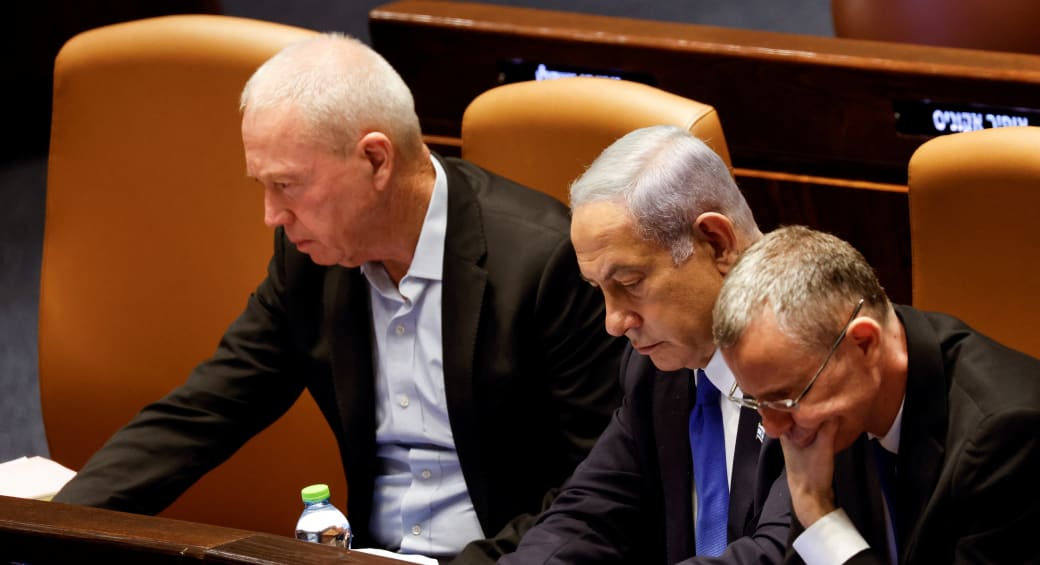

What is the next stage of the Israeli government's judicial reform?
The next bill that the coalition will likely promote is on the Judicial Selection Committee, perhaps the most contentious issue of judicial reform.

With the passing of the reasonableness standard bill on Monday, leaders on both sides of the debate have indicated that they believe that it is a non-decisive battle in a longer war.
The next bill that the coalition will likely promote, if negotiations don't resume as Prime Minister Benjamin Netanyahu proposed on Monday night, is on the Judicial Selection Committee.
The Judicial Selection Committee is perhaps the most contentious issue of judicial reform, a matter where experts, NGOs and negotiating parties have said were unable to even approach consensus.
Go to the full article >>Are protests just about judicial reform or political agendas? -analysis
The fact that all of the opposition is against the reform and all of the coalition in support of the reform indicates that there is at least some realpolitik at play.

The protests against the government’s judicial reform have been confusing from the beginning, with several complicated legal provisions at the crux of the debate. But even more perplexing and troubling for some is how ancillary issues, such as women’s rights or peace activism, are connected to the reform and lead to other controversial demonstrations, including the one at the Chief Rabbinate building in Tel Aviv last Tuesday.
Or on Saturday night, protesters hung a sign from a bridge in Tel Aviv declaring, “We don’t kill and we won’t die in service of the settlements.”
Religious Israelis rightly expressed concern that they are under attack, as those living beyond the Green Line feel targeted by such signs.
There is nothing in the current reform proposals that explicitly addresses disputed territory or settlements, and critics of the protest movements argue that such displays show that the protests are not just about the coalition’s policies to change the legal system but are a political challenge to the existence of the current coalition.
Coalition MKs have argued that the opposition was angered that it lost the election; the losing factions have been trying to unseat the government ever since, and fostering judicial reform protests is just a means to that end.
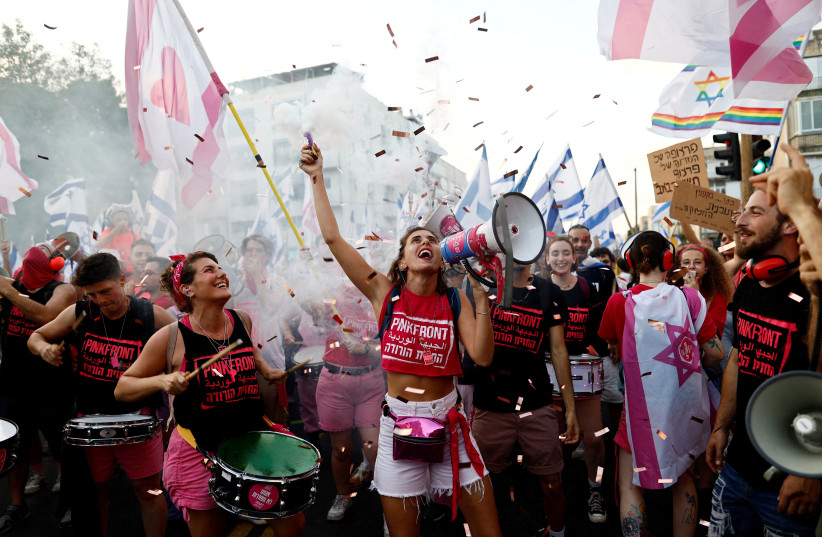
That all of the opposition is against the reform and all of the coalition supports the reform indicates that there is at least some realpolitik at play.
Many in the anti-reform camp genuinely seem to see the provisions of the judicial reform as inextricably connected to their championed causes.
Building an Alternative women's right activists spoke with Jerusalem Post
The entire reform would ruin the system of checks and balances provided by an independent judiciary, and the result would be a tyranny of the majority, activists from the women’s rights group Building an Alternative told The Jerusalem Post at protests in Jerusalem’s Sacher Park on Sunday. In that scenario, minorities ultimately suffer, particularly women’s rights advocates, they said.
One activist took the thought thread even further and said: “Women are the largest minority, but this could harm [members of] the Arab sector, who are the most economically and socially vulnerable.”
The reasonableness standard bill debated in the Knesset plenum on Sunday was just the beginning, they said, for if passed, it would remove the requirement for reasonable government actions and allow capricious and arbitrary actions that would impact individual rights.
The protest against the rabbinate was about the legal status of women and marriage, they said, which falls under their concerns about reform of the legal system.
“We’re not against reform; we’re against this reform,” said one women’s rights activist.
Yet there are many interests pursued by the group and others that do seem beyond the scope of what can be impacted by the judicial reform, even through secondary effects.
“The government from its first day in power hasn’t dealt with the major issues,” one activist said.
A misappropriated budget, lack of funds and manpower for workers with children with disabilities, an overworked medical staff, a troubled education system, and fears that religious dictates may be forced on secular people may be genuine issues and worthy of redress, but it is debatable whether it is necessary or desirable to lump them in with all the judicial reform controversies.
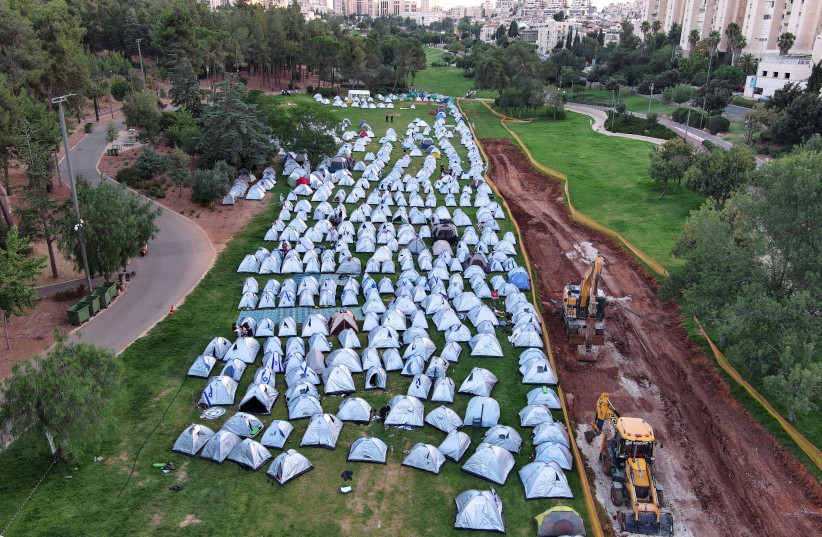
The activists did say their goal wasn’t to interfere with the government, but rather to advocate on behalf of everyone. But when the reform acts as a trigger for all the other aspects of the government’s agenda, it’s difficult to address the actual reform debate.
Part of the confusion comes from the chaotic nature of the protests. Demonstrators at Sacher Park seemed to be part of multiple organizations at once, and they brought their own signs, T-shirts, and people – and undoubtedly their own agendas as well.
While Israeli flags are always dominant, anti-settlers signs, Palestinian flags and other political messages will inevitably be found in the massive crowds if everyone is accepted under the loose coalition of NGOs and protest groups.
Some groups may be trying to use the reform to promote their special interests, or they may be pushing them as a secondary objective. But based on anecdotal conversations with different activists on Sunday, it’s likely that many can’t help but unintentionally or subconsciously tangle their thoughts and feelings on different issues together.
It is no wonder that rhetoric is so heated about judicial reform when everything is all bound together in one package of political concerns. Consequently, the specific judicial reform issues can’t be differentiated from general misgivings about Prime Minister Binyamin Netanyahu’s coalition agenda.
Reactions to the controversial bridge sign in Tel Aviv, however, show that accident or intentional, lumping political sentiments together creates polarization.
Rather than just deal with a contentious debate about proper governance, we are creating a war of all political agendas versus all political agendas, in which everything is on the table at once with the highest stakes possible. Much-needed debates about the relationships between government branches become a conflict of secular versus religious, center vs settlements, and Left vs Right – despite both sides insisting otherwise. With such stakes, it becomes difficult to de-escalate.
The judicial reform is confusing enough as it is, and if Israelis want to be able to address the issues with the legal system, they need to be able to disentangle all their other political problems and address them separately – no matter how noble they might believe them to be. Otherwise, issues that might be negotiated on will remain unsolvable.
Go to the full article >>Journalist attacked at pro-reform protest in Tel Aviv
Protesters at the demonstration held signs saying that "The High Court of Justice is dripping with Jewish blood."

An N12 journalist was attacked by protesters at a pro-judicial reform protest in Tel Aviv on Sunday evening, as tens of thousands of demonstrators gathered in the intersection in front of Azrieli Center to demand the continuation of the judicial reform.
Videos from the scene showed protesters surrounding the journalist and the camera crew and pushing them, with a police officer attempting to intervene. The assailants chanted "shame, shame" and "[Kach party head Meir] Kahane was right."
יריקות ודחיפות: כתב חדשות 12 גלעד שלמור הותקף בהפגנת תומכי הרפורמה בת"א - וחולץ על ידי המשטרהhttps://t.co/epxYFPphpL pic.twitter.com/Q7pHkaPNPJ
— החדשות - N12 (@N12News) July 23, 2023
Police Chief Kobi Shabtai arrived at the protest later in the afternoon.
Protesters attack AG, reservists ending volunteer service
Protesters at the demonstration held signs calling for Attorney-General Gali Baharav-Miara to be fired and saying that "The High Court of Justice is dripping with Jewish blood."
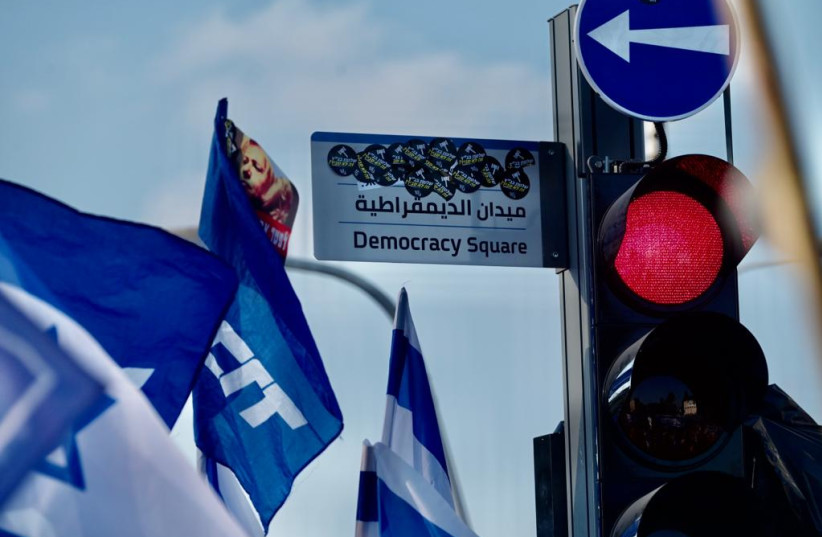
Additional signs attacked volunteer reservists who have chosen to suspend or end their volunteer service due to the advancement of the judicial reform and signs questioning why there is no Yemenite justice in the High Court, a reference to concerns that there are mostly Ashkenazi justices in the High Court. (The current High Court includes one justice whose parents immigrated from Iraq, one Muslim justice, and one justice whose parents immigrated from Morocco)
Protesters also placed stickers reading "Reform Square" and other slogans on a sign recently put up by the Tel Aviv Municipality naming the intersection on Kaplan Street "Democracy Square"
The protest was endorsed by some religious Zionist rabbis and coalition members in recent weeks, with some right-wing movements organizing buses to transport protesters from the West Bank and a few locations in northern and southern Israel to the demonstration.
Go to the full article >>Brotherhood is the word of the day at Jerusalem's judicial reform protest
Volunteers spent the day supplying the protesters at Gan Sacher with everything they needed on Sunday.

A veritable protest city had been set up at Gan Sacher on Saturday night, a tent town constructed by judicial reform opponents marching from Tel Aviv. On Sunday the metallic gray lining of hundreds of tents reflected the 95-degree sun, giving the site a metropolitan glow.
Thousands of pilgrims ending their five-day march from Kaplan Street in Tel Aviv set up the tents as part of a protest campaign against the reasonableness bill being debated in the Knesset. Despite the extreme heat and the advancing legislation, the mood in Gan Sacher’s tent city was jovial.
Protestors relaxed in the shade of trees and large beige canopies. People of all ages strolled through the temporary protest Mecca, wearing shirts that said “The Walk of Freedom,” and “Democracy or Rebellion.” As if it were any other outing to the park, they ate watermelon and hummus sandwiches and listened to music. In typical Israeli entrepreneurial spirit, by the High Court of Justice building, a recording advertised ice-cold "democratic" water and hot bagels against dictatorship. There were even mobile toilets and snack benches set up.
Arnon Lahav, an older tour guide with a saxophone slung around his neck, softly played the American protest classic “We Shall Overcome” as he strolled through the tents. He said he’s only missed one of the weekly Saturday protests since they’ve begun, and he only missed the one protest because demonstrators blocked traffic.
“It is a pleasure for me to see all these tents and all the people that come here, that leave their homes, leave their jobs, leave their hobbies, and come to demonstrate because it is from the bottom of their hearts,” Lahav said.
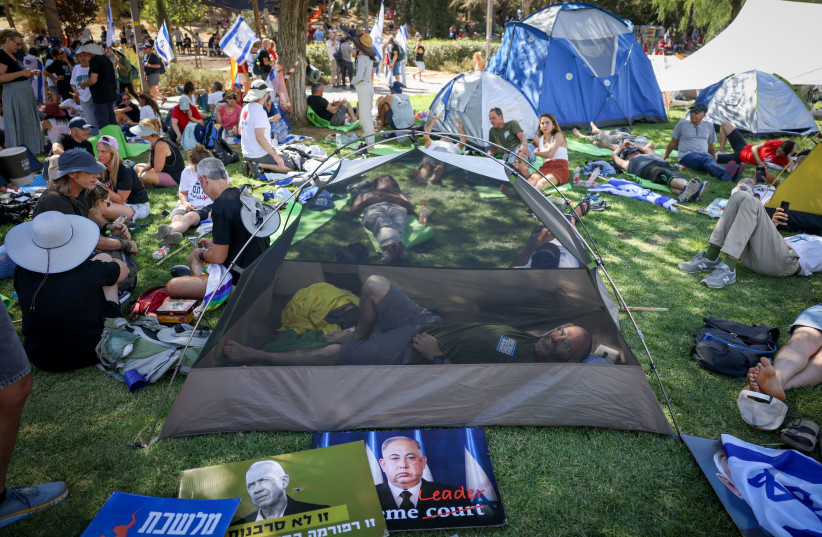
The tents were donated by “many, many people,” protest leader Ami Dror said. This volunteerism seemed to be the cornerstone of the tent city; volunteers from various organizations brought food, ice, water, blankets, protest signs, and whistles. A medical team in orange vests walked around, seeing if anyone was dehydrated or had other issues.
Many of the volunteers were too busy dragging buckets of ice or answering questions to talk, but Maya Ofec was open to talking about the demonstration. She came for the second day of the march in Bet Shemen, and by the night, she was already starting to help with organization.
“People who walked and completed the march are exhausted, but everyone is pitching in,” she said. “That is the most beautiful thing.”
Protest was a logistical challenge for volunteers
The hardest part, she said, was estimating how much food or tents to get. Volunteers would make a guess, and then that number would severely underestimate the number of protestors. To help with that problem, the volunteers have tried to make use of sustainable items. If someone uses a mat to sleep on and then leaves, that mat goes to someone else or becomes a table to eat on.
When someone volunteers enough, they start managing an area of the tents, providing everything that protesters may need in that area. Ofec said that she thinks the high level of organization comes from everyone’s experience in the Israeli Defense Forces.
“We can understand how we can do things quickly, and if you give someone responsibility, they will take it to the fullest extent,” she added. “It’s sisterhood and brotherhood at its best.”
“I feel like I'm part of a community that has abundance, where everything feels big and done effortlessly.”
Vered Reznik
Vered Reznik, who slept overnight at Gan Sacher with her friend from Tai Chi, said she only came with a backpack of clothes. She knew that everything else would be provided to her by the volunteers.
“I feel like I'm part of a community that has abundance, where everything feels big and done effortlessly,” she said. “If I say I am hungry, they will feed me.”
On Saturday night, around 1 a.m., a group of young Haredi boys harassed protesters in the tents, Reznik added. They yelled that the protestors stunk, that the reforms would pass no matter what, and other “bad language,” she said. Other Haredim passed by in cars and blew their horns to wake up those in tents.
Eventually, the police came and removed the harassers, but nobody was arrested, according to Reznik. The message she took from the incident was that they were envious of the protesters' abundance.
“The other side doesn’t feel the connection, the brotherhood we have,” she said, waving her arms around to show the thousands seated next to her. “That’s why they are so hateful.”
Asaf Agmon stood at the entrance of the park, his injured arm still in a sling from when he said he had been pushed by police. A 53-year veteran of the Israeli air force, like most activists Agmon was involved with multiple organizations working to fight the passing of the reasonableness standard bill.
“The law will limit the ability of the court to provide a check to the government,” said Agmon, who noted that Israel already has a weak separation of powers. “That isn’t reasonable.”
Agmon explained that without the standard, the government would be free to make a wide variety of unreasonable decisions that could impact individual rights. Corrupt or unsuitable people could be given important roles in the government, bringing a “revolution” into effect without passing further legislation.
“If we were just talking about this law, we could think of ways to find a solution,” said Agmon.
The outcome seemed unclear to Agmon, who said that Prime Minister Benjamin Netanyahu understood that he was in a lose-lose situation – either lead the army into a catastrophe with mass resignations or be removed from power and suffer repercussions with his ongoing corruption trials.
According to several protesters at Gan Sacher, Netanyahu’s trials and the ostensible capability to influence them through the reform was a driving factor in the legislative ventures. Agmon felt that the situation was different than in March, the last time anti-reform protests had peaked; more people had come to realize the scope of the problem, and the need for a broader agreement. He said that most people wanted a negotiated solution and that if there were elections, Netanyahu would lose.
Protest continued to grow throughout the day
The protest town's residents grew with several migrations of protestors pouring in. In just one hour, the size of the crowd doubled, as opponents to the judicial reform prepared to march towards the Knesset in the evening.
Many of the people there had only been marching a day or two, but others had fully made the pilgrimage from Tel Aviv to Jerusalem. Dorit Eshalom, a retiree with an easy smile, is one of the pilgrims. She said that sleeping in the tents was “great,” and that people easily offered their homes for her to shower and rest during the day.
“Everybody takes care of everybody,” Eshalom said. “All the people came and it was like a big family of 50,000 people.”
Eshalom’s parents fled the Holocaust and embedded her with the spirit of resistance, she said.
“All the people came and it was like a big family of 50,000 people.”
Dorit Eshalom
“You don’t realize what you are losing until it’s gone,” she said. “We want to see the end of this until it's done.”
The soberness of the moment had yet to resonate throughout the camp. Near the heart of the tents, a protester had set up a 3-D poster of Prime Minister Benjamin Netanyahu, National Security Minister Itamar Ben-Gvir, and others urinating on the street, using water as urine; “piss in the Middle East,” it read. Children giggled and played in the streams.
Despite the high spirits, the stay in the park was not a vacation – several protesters said that they had closed down their businesses or taken a day off of work to come to protest. One couple who owns several kindergartens in Tel Aviv closed the business for the day.
One older tour guide, who walked all five days, said that he had to reschedule many things to let him participate in the protest. He requested to be anonymous because he is a lieutenant colonel in the army reserves, and he is due to return to the army in three days.
He said that his time at the protests would cost him monetarily, but not as much as the emotional cost.
“I have fought in three wars for Israel,” he said. “Then I lived in a Kibbutz, literally working the land. I literally spilled my blood to defend this place. I have done a lot of violence for this country. But in this situation, it doesn’t make any sense.” His eyes welled up in tears, and he looked away.
Go to the full article >>'Judicial rift parallels Tisha B'Av,' former US Amb. Friedman warns
Tisha B'Av is a day of fasting that marks the date of several tragic events in Jewish history, including the destruction of both Temples in Jerusalem.
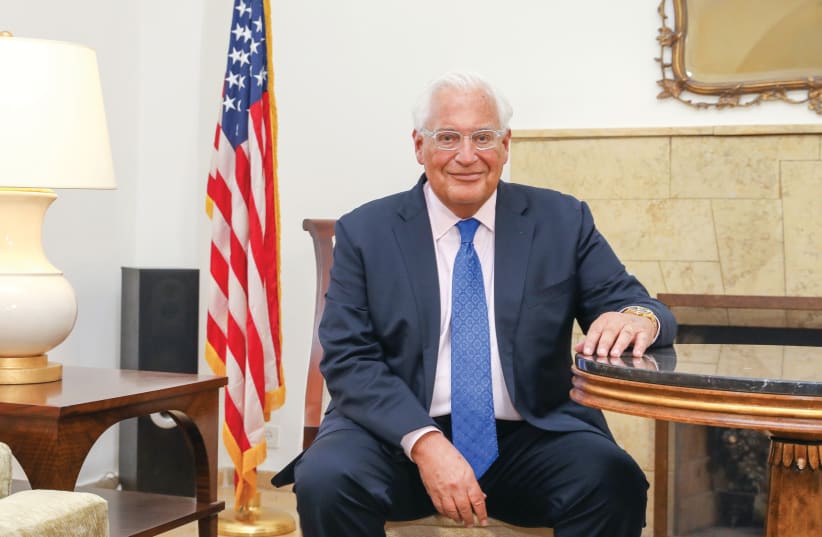
The heated debate over the government's judicial reform plan parallels tragic events in the Jewish people's past, former US ambassador to Israel David Friedman said on Sunday, pointing out that the fast of Tisha B'Av is this week.
"Given the striking parallels between Israel’s current internal rift and the infighting that caused the destruction of the Second Temple 2000 years ago, why would the Israeli Government proceed with its Judicial Reform bill on the eve of Tisha B’Av? Very bad timing," Friedman tweeted.
Given the striking parallels between Israel’s current internal rift and the infighting that caused the destruction of the Second Temple 2000 years ago, why would the Israeli Government proceed with its Judicial Reform bill on the eve of Tisha B’Av? Very bad timing.
— David M Friedman (@DavidM_Friedman) July 23, 2023
Tisha B'Av is a day of fasting that marks the date of several tragic events in Jewish history, including the destruction of both Temples in Jerusalem.
The destruction of the Second Temple after a Jewish rebellion against Roman rulers, who besieged Jerusalem. During the siege, amid fighting between Jewish factions, zealots burned the city's food supplies, an event that has often been used as a metaphor in Hebrew for Israeli infighting in recent years.
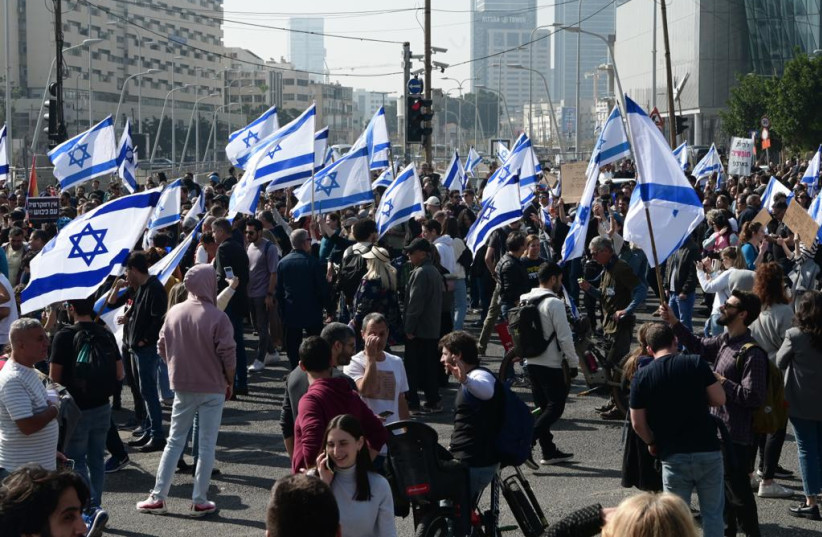
100 former Israeli diplomats signed petition
Also Sunday, about 100 former Israeli diplomats signed a petition stating that the judicial reform plan is "undermining [Israel's] international standing and eating away at the network of critical connections it has in the world."
"We are especially concerned by the open rift created with our best friend and ally and the one and only strategic support Israel has in the world, the US," the diplomats said. "Israel was born a democracy and its belonging to the free democratic world does not only express the spirit of the people and their will but is a central component in its security, diplomatic, economic, scientific and social capabilities."
Among the signatories of the letter are prominent former diplomats such as former ambassador and Labor MK Colette Avital, former ambassador to Germany Jeremy Issacharoff, the pro-BDS former director-general of the Foreign Ministry Alon Liel, former ambassador to France Daniel Shek, former deputy head of the National Security Council Eran Etzion, and all of Israel's former ambassadors to the EU from the past decade.
Ex-ambassador to South Africa Arthur Lenk tweeted that the letter called on Netanyahu "to stop the judicial legislation to protect Israel's democracy and our shared values and vital relations with our closest allies."
I was one of 100 former Israeli ambassadors and diplomats who signed a letter today to PM Netanyahu calling on him to stop the judicial legislation to protect Israel's democracy and our shared values and vital relations with our closest allies. https://t.co/YXFuvjyqLn
— ארתור לֶנק آرثر لينك (@ArthurLenk) July 23, 2023
Former ambassador to India Daniel Carmon tweeted that "with the same pride with which I represented all governments of Israel in the US, in Argentina, in the UN and in India, I am proud to be part of this group of senior diplomats who fear for the fate of the country under this crazy extremist coup."
👇🏻👇🏻תבלום בלימת חירום, תעצור את החקיקה, @IsraeliPM @netanyahu , לפני שיהיה מאוחר👇🏻👇🏻 https://t.co/6KFDcInAIH
— 🇮🇱Daniel Carmon🇮🇱 (@danielocarmon) July 23, 2023
Netanyahu famously disdains the Foreign Ministry, writing about how he found their work lacking in his memoirs and often undermining the ministry's work over his years in office by dividing its authority among other ministers.
Go to the full article >>Likud rejects Histadrut judicial reform compromise proposal

The Likud Party rejected a compromise proposal on Sunday submitted earlier by the Histadrut Labor Federation, claiming that the proposal was exactly like the proposal presented by opposition leader Yair Lapid.
"[The Histadrut] unilaterally accepted the opposition's position as it was since the beginning of the process," said the Likud.
Go to the full article >>Lapid meets with Histadrut leaders amid talks of widespread strike
The two reportedly discussed the outline for dialogue that the chairman and his colleagues had recently presented to the prime minister.
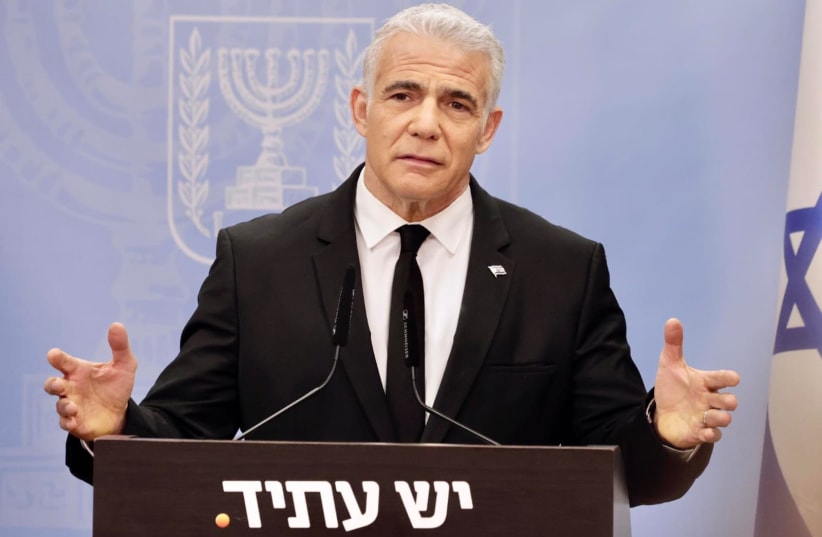
Former prime minister and current Opposition Leader Yair Lapid was seen entering the Histadrut labor federation building on Sunday morning, after the unions had given the government a deadline of 4 p.m. on Sunday to stop legislation before they strike.
"We will do everything, including strike as per the law, in order to prevent unilateral legislation that grievously harms the economy," representatives from the business forum said.
Go to the full article >>Protesters arrive in Jerusalem after multi-day trek from Tel Aviv
Protestors claim they are not as bothered by the heat as they are by the potential outcome if additional reforms pass.

Tens of thousands of protestors against the government's judicial reforms arrived at the Knesset in Jerusalem on Saturday afternoon ahead of a vote on the reform set to take place on Monday after marching through extreme heat, some for a number of days. The march began on Tuesday in Tel Aviv, and the number of marchers swelled throughout the weekend.
The protestors marched on Highway 1 during some of the segments, causing congestion and leading to police deployment. During most of the march on Saturday, the marchers occupied one lane on the highway, and two other lanes remained open.
Go to the full article >>Scenes from the street: Protests heat up as gov't prepares for judicial reform vote
Take a look at some of the best snapshots from across Israel as the government prepares to pass the first piece of judicial reform legislation.
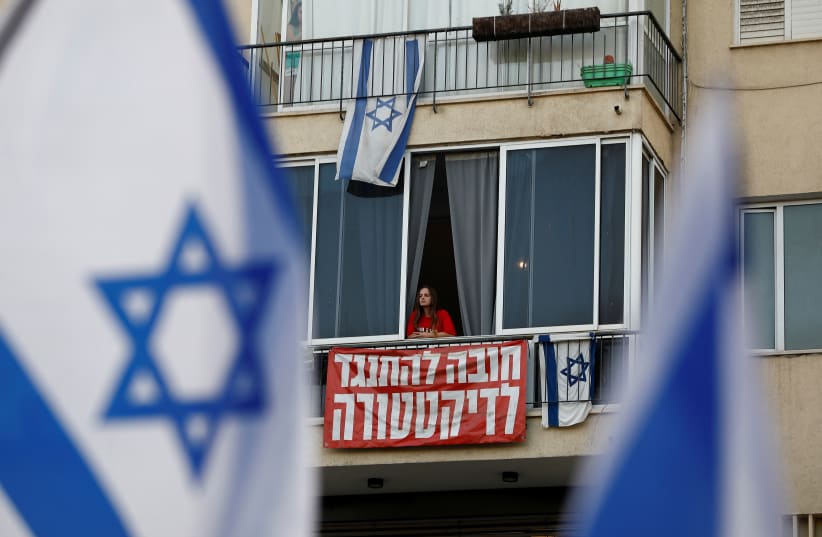
As the government prepares to pass the first piece of judicial overhaul legislation in Knesset on Monday afternoon, protests have continued across Israel.
Take a look at some of the highlights of Sunday's events as they develop:
Go to the full article >>Final debate on Israeli reasonableness bill begins in Knesset plenum
"The current situation is not democracy, and not the rule of law," Simcha Rothman said. "The High Court will not determine what is reasonable, the ministers will determine [that]."
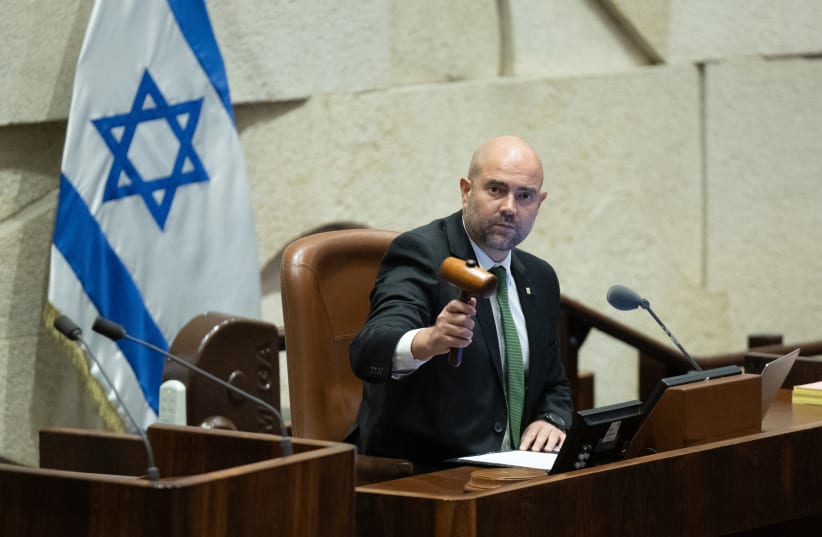
The final debate on the reasonableness standard bill began on Sunday morning in the Knesset plenum and will last for 26 straight hours until Monday at 12:00 p.m. The plenum is then scheduled to begin voting on the bill, which will take a number of hours. The bill is expected to pass into law at some point on Monday afternoon.
Knesset Constitution, Law, and Justice Committee chairman MK Simcha Rothman (Religious Zionist Party) presented the bill.
Go to the full article >>Israel's Judicial Reform
- The Knesset passed the bill to cancel the reasonableness standard into law on Monday, marking the first part of the government’s contentious judicial reform to pass into law